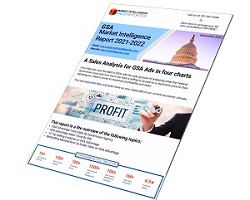Growing a small business is never an easy task, let alone in the uncharted territory of the post-pandemic market. If you’re a business owner looking to maximise your opportunities, and have some experience of selling to the U.S. Government, your company could then be eligible for a GSA Schedule and the fantastic benefits that come alongside it.
- What is GSA?
- What does GSA buy?
- What is the size of the GSA market?
- Ways to maximise GSA business
- How can I learn about GSA MAS for my small business?
What is GSA?
GSA stands for the General Services Administration, which works behind the scenes of the U.S. Government to manage their real estate and help procure goods and services. GSA acts as the mediator between commercial business and government agencies and, to streamline this interaction, GSA developed their Multiple Award Schedule (MAS) Program – commonly known as the GSA Schedule. GSA Schedule contracts allow the government to buy quality products and services with pre-negotiated prices, delivery terms, and other T&Cs. In return, a GSA Schedule provides companies with five-year contracts, stable business with government customers, fantastic marketing tools and much more.
What does GSA buy?
GSA procurement involves twelve ‘Large Categories’ of products and services:
· Industrial Products & Services
· Furniture & Furnishings
· Transportation & Logistics Services
· Scientific Management & Solutions
· Travel
What is the size of the GSA market?
To understand the opportunities that a GSA Schedule can give your small business, here are some statistics:
· The GSA MAS Program is a $45 billion government contract.
· In the fiscal year of 2020, small businesses earned more than $13.5 billion in sales thanks to their MAS contracts – this averaged at more than $1 million for each business.
· GSA sales by small businesses expanded by more than 20% in the last five years.
· Small businesses earned the most by far in the IT and Professional Services Large Categories.
So, how can you grow your small business with a GSA Schedule?
Ways to maximise GSA business
1. Sell what the government buys
To find your place in the market you must research and understand what the government wants to buy. Ways to do this include:
· eBuy: an online Request for Quotation (RFQ) tool where government customers solicit various products and services. eBuy can be used by GSA Schedule holders and businesses with technology contracts, like the IT Schedule 70.
· Dynamic Small Business Search (DSBS): a database used by government customers to find potential small business contractors. DSBS consists of information about your business which you provide when registering on the System for Award Management (SAM). This business profile includes your specific NAICS codes (reference numbers categorising the commercial products or services you offer). It is administered by the Small Business Administration (SBA), a federal agency which can help small businesses like yours to expand their opportunities.
· Professional tools: at Price Reporter we have a Federal Market Intelligence Research Tool that identifies government trends, shows top selling products and their potential market size. You can leave it to us instead of doing the time-consuming search yourself.
2. Be competitive
Your pricing strategy determines your success or failure in the GSA market. However, it is a delicate balancing act: your prices must be competitive enough to attract federal buyers, but high enough to be profitable for your small business.
You should determine your prices according to competition and by evaluating your own direct and indirect costs – some businesses make the mistake of lowering their rates just to win a bid and undermine all their hard work in the process. You can also be competitive by using “sale” prices; this simplifies price list adjustments as no formal modification is required to decrease prices.
Constantly checking your competitors’ prices is hardly the most effective use of your time, especially if your GSA price list contains thousands of products. At Price Reporter we offer a GSA pricing tool which evaluates how your small business stacks up to competition, and helps you manage your price list. To start, all you’ll need is your GSA Schedule Number.
3. Expand your catalogue with new categories of products and services
Every product or service that can be purchased through a GSA Schedule is assigned a Special Item Number (SIN – these align with the NAICS codes that we mentioned earlier). Your GSA contract states the SIN of the product or service that your business offers. When a government buyer sends out a Request for Quote they have to reference the SIN of the thing that they want to buy, and only Schedule holders with this particular SIN can see these opportunities.
To make sure that you’re always in the running for new prospects, you should regularly review the GSA services and products that you provide. A crucial part of growing your small business with GSA involves adding new SINs and removing those that don’t work for you. Updating your catalogue with new products involves changing your GSA contract and providing a fair number of documents (invoices, statements of work etc). A consultant who specialises in GSA and SINs can help you with all of this and ensure that your small business doesn’t miss any opportunities for growth.
4. Apply for BPAs
There’s nothing better than a repeat customer, and a Blanket Purchase Agreement (BPA) is a way for a GSA Schedule contractor to achieve this profitable relationship. When a government buyer needs to make the same purchase over and over again, they can set up a BPA.
This is a simplified acquisition method where the buyer allocates a finite budget for particular goods or services that they anticipate to be in need of, specifying the order’s frequency, invoice, delivery locations, lead time, etc. The contractor chosen for the BPA can sell repeatedly until the budget has been used up, gaining increased revenues from bulk sales, while benefiting from reduced administrative work.
5. Participate in GSA events
Adapting to the post-pandemic world, GSA offers many online events such as training days, workshops and webinars which are a great place for small businesses to learn something new. On the GSA website you can find details of upcoming events.
GSA’s biggest annual event is the multi-day FAST Conference, where federal agencies are in attendance and contractors can exhibit their companies. Although held online in 2020 and 2021, the in-person conference will be the ideal place to meet GSA officials, network with GSA buyers and fellow small businesses, and showcase your company and its products and services. FAST also holds monthly online conferences of different themes.
6. Sell on all government marketplaces
GSA Schedule holders have access to exclusive government marketplaces, which open up a whole range of sales and marketing opportunities for small businesses. These online tools include:
§ FedMall: the premier e-commerce acquisition platform of the U.S. Government, whose customers include the military, federal, state and local governmental agencies.
§ GSA Advantage!: this online catalogue where millions of products are advertised has been compared to the U.S. Government version of Amazon.
How can I learn about GSA MAS for my small business?
The advantages of the GSA Schedule for small businesses are clear. To learn more about how you can maximise your business opportunities or to find out about GSA qualification requirements, get in touch with one of Price Reporter’s consultants today.








